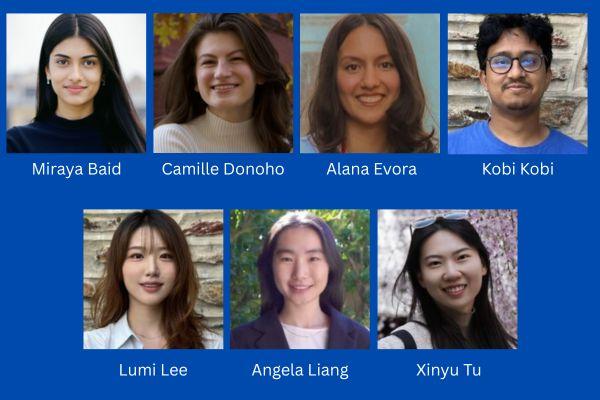
Meet the newest cohort of students in the Duke Neurobiology Graduate Training Program. These scholars bring a wide range of academic backgrounds, research experiences, and personal interests to the department. Each one shares a deep curiosity about the brain and a commitment to collaborative, discovery-driven science.
Miraya Baid
Miraya Baid was drawn to the Duke Neurobiology Graduate Training Program for its unique approach to bridging foundational questions in neuroscience with clinical relevance. “I was attracted to the Neurobiology Department’s ability to ask foundational questions about action, motivation, and volition… and to ground them in synaptic and circuit mechanisms while translating them to patient impact,” Baid said. Her previous research experiences — studying grasp kinematics and tactile feedback at the University of Chicago and exploring premotor inputs at Northwestern University — aligned well with Duke’s emphasis on the continuum from genes to behavior.
Originally from Mumbai, India, Baid earned her BA in biology and psychology with a concentration in neuroscience from Grinnell College. Outside of her academic pursuits, she enjoys reading, painting, trying new foods, and spending weekends outdoors exploring local ecology and wildlife.
Camille Donoho
Camille Donoho was drawn to Duke not only for its outstanding research but also for its collaborative spirit. “I was attracted to the high level of collaboration between departments within the School of Medicine and across the many other schools in the greater university landscape,” Donoho said. She also appreciated the genuine enthusiasm and happiness expressed by current students, which helped solidify her decision.
Originally from Bryn Mawr, Pennsylvania, Donoho earned her Bachelor of Science from Brown University. In addition to her scientific pursuits, she holds an undergraduate degree in music and spends much of her free time playing classical double bass. She also enjoys dancing and choreographing ballets.
Alana Evora
Alana Evora traces her path to graduate study back to her time working as a research technician in the lab of Arnaldo Carreira Rosario, PhD, at Duke. There, she investigated the development of inhibitory neurotransmission using fruit flies, an experience that sparked her interest in developmental and systems neuroscience. “I had the opportunity to attend neurobiology seminars and even present a poster at the Neurobiology Department retreat in 2024,” Evora said. The welcoming and intellectually engaging environment convinced her to join the Neurobiology Graduate Training Program.
Originally from Cornelius, North Carolina, Evora earned dual degrees in biology and computer science from Elon University. Outside the lab, she enjoys playing tennis, drawing, and staying connected with friends and family over the phone.
Kobi Kobi
Kobi Kobi chose Duke for its strong research, outstanding faculty, and the positive energy among its students. “Ultimately ended up choosing Duke as a two-body decision,” he said, noting that both academic excellence and personal considerations played a role in the choice. The combination of scientific rigor and a genuinely happy student community made Duke stand out among other programs.
Originally from Queens, New York, Kobi earned a BS in neuroscience and computer science from the City University of New York Baccalaureate for Unique and Interdisciplinary Studies/Macaulay Honors College. Outside of research, Kobi enjoys spending time in nature, playing obscure sports like NYC 1 Wall/Gaelic handball, jai alai, and padel, and exploring the science behind everyday things — from cooking to cleaning products to cars.
Lumi Lee
Lumi Lee came to the United States seeking a diverse, international research community and advanced neuroscience training beyond what was available in South Korea. She chose Duke for its strength in systems neuroscience, collaborative culture, and mentorship. “Hearing current students speak with genuine passion and satisfaction about their research and experiences convinced me that Duke’s supportive environment is the ideal place for me to thrive as a scientist,” Lee said.
Lee earned her Bachelor of Science from Sungkyunkwan University and is originally from South Korea. In her free time, she enjoys playing squash, swimming, watching movies, reading both neuroscience books and novels, and exploring nature.
Angela Liang
Angela Liang was drawn to Duke for its alignment with her research interests and its strong sense of community. “I was really drawn to the research being conducted at Duke, as it aligns closely with the questions that I am excited to pursue in my own work,” Liang said. She also found the department’s supportive and collaborative environment to be a key factor in her decision.
Originally from Orange County, California, Liang earned a BS in physiological science from UCLA. In her free time, she enjoys practicing yoga, reading, and watching shows.
Xinyu Tu
Xinyu Tu chose Duke for its rich intellectual environment and collaborative culture. She was especially impressed by the department’s diverse approaches to studying brain function and the meaningful interactions she had during her interview. “Visiting campus confirmed the supportive and collaborative environment here,” Tu said, adding that “together with all the resources at Duke and in Durham, convinced me this is the ideal place for both my research and my life.”
Originally from Xi’an, China, Tu earned dual bachelor’s degrees in pharmaceutical sciences and psychology, followed by a master’s in pharmacology — all from Peking University. In her free time, she enjoys attending concerts and performances, making and savoring coffee, traveling, and photography. She’s also a beginner in ballet and meditation, where she practices how to “stop thinking” and focus on body and mind.